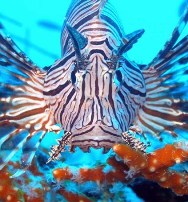Lionfish found in Mediterranean signal alarm
 (CNS): The invasive lionfish, which has become a serious threat to the marine life in the Caribbean, has now found its way into the waters of Mediterranean Sea via the Suez Canal, scientists believe. According to research undertaken by scientists from the American University of Beirut in Lebanon and the Institute for Environmental Protection and Research in Italy, published this week, the discovery of two lionfish at the end of 2012, more than two decades after the one and only species recorded there was captured, indicates a future potential invasion of the sea. As a result, the researchers have raised the alarm to begin an awareness campaign before it is too late.
(CNS): The invasive lionfish, which has become a serious threat to the marine life in the Caribbean, has now found its way into the waters of Mediterranean Sea via the Suez Canal, scientists believe. According to research undertaken by scientists from the American University of Beirut in Lebanon and the Institute for Environmental Protection and Research in Italy, published this week, the discovery of two lionfish at the end of 2012, more than two decades after the one and only species recorded there was captured, indicates a future potential invasion of the sea. As a result, the researchers have raised the alarm to begin an awareness campaign before it is too late.
The research paper by M. Bariche, M.Torres and E.Azzurro states that the two lionfish were captured separately off the village of Al Minie in the northern part of Lebanon and identified as the invasive species in October and December last year. In addition, the researchers believe that two more lionfish were caught earlier this year off the coast of Cyprus.
According to the paper, the scientists say the only previously recorded catch of a lionfish in 1991 had probably been released from captivity or entered through the Suez Canal, like other hundreds of marine organisms, which is how they think the latest fish arrived.
The recent records from Lebanon, which occurred more than two decades later, provide evidence, they now believe, of the arrival of the new fish in the Mediterranean Sea. Lionfish are now common in the Red Sea and the proximity of the Suez Canal to the recent sightings seems to be the most likely pathway for the introduction of the species into the Mediterranean Sea, the scientists stated.
Lionfishes can potentially spread and survive in a large part of the Mediterranean Sea because they have shown extensive dispersal capabilities and can survive to a minimum temperature of 10°C, the experts stated. Their highly venomous needle-sharp dorsal, anal and pectoral fin spines offer protection and significantly reduce predation. However, a natural predator already exists in the Mediterranean.
In the northern Red Sea, a juvenile lionfish was discovered in the stomach of the blue spotted cornetfish, which has invaded the Mediterranean Sea within the last decade and established large populations in the eastern part, which could act as a biological control of a possible invasion. Other possible predators could be native Mediterranean groupers, which have been pointed to as possible predators here in the Caribbean.
The recent findings of lionfish may be an indication of a new wave of arrivals, raising “justifiable concerns of a possible onset of a new invasion in the Mediterranean Sea,” the scientists wrote.
“Many Caribbean countries have instituted Lionfish eradication programs. These actions include initiatives that involve the general public in removal efforts, such as engaging recreational divers to capture Lionfish and using commercial divers and fishers to target this species as a source of food,” they wrote in the paper.
The marine biologists warn that the lionfish is amongst the most successful marine invaders in the history of aquatic invasions and note that once it has established a permanent population, its complete eradication seems to be unrealistic. As a result, they urge the authorities to learn the lessons from elsewhere andbegin an awareness campaign to implement monitoring efforts during the early stages of colonization, when control measures could still be effective.
Category: Science and Nature

